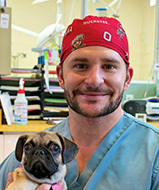When It Looks Like Your Dog Is Suffering from a Painful Tooth …
It can be difficult to tell when a dog is suffering from a painful condition because they aren't able to voice their discomfort like humans can. Being able to identify the signs and symptoms that your dog might be in pain can be a very important part of being a pet owner.
A dog can develop tooth pain for several reasons. Some of the most-common causes include infected or swollen gums, a broken tooth, and tartar build-up; dogs can develop cavities too. Not identifying your dog's oral pain may result in more severe health problems like infections, loss of teeth, and other systemic issues.
This guide will help you learn more about ways dogs show pain in the mouth region. Here are some of the most-common signs and symptoms:
Unusual Drooling
Dogs drool when they're chewing on treats and toys, but when a dog is suffering from tooth pain, he may start drooling more frequently than usual. The reason for this is that the salivary glands work overtime whenever there's an injury or pain in the mouth.
In some cases, blood may be visible in the saliva. If this is the case, you should take your dog to the veterinarian as soon as possible because he may have a more serious problem.
Bad Breath in Dogs
Healthy dogs don't tend to have bad breath. If your dog's breath is starting to smell foul, then he may have something going on in his mouth. Bad canine breath can be a sign that your dog may have tooth decay or an infection, and either one of these may be causing her to experience tooth pain.
Loss of Appetite
When a dog is suffering from tooth pain, he may not eat as much as he usually does because it may be hurting him to chew. You may notice him start eating and then abruptly stop. He also may whine when eating or spit out his food.
Loss of appetite is a symptom that may be associated with many health problems, so regardless of whether or not the cause of it is tooth pain, take your dog to your veterinarian immediately if his appetite suddenly changes.
Sneezing and Nasal Discharge
If gum disease is left untreated, it may cause the bone between the nasal and oral cavities to thin. This happens in advanced cases of gum disease in the upper canine teeth and sneezing and nasal discharge will be two signs that this may have occurred.
Your Dog Has Been Chewing on One Side of the Mouth Only
Like humans, when a dog has tooth pain on one side of his mouth, he may chew only on the side that isn't painful. He may suddenly drop food or a toy he is carrying in his mouth if it accidentally touches the painful side.
Sudden Shyness
If your dog usually loves being petted, and then suddenly starts moving his head away from your hand, tooth pain may be causing him to act shy. He just doesn't want you to touch his head for fear that it will increase his pain.
Visible Changes in Your Dog's Mouth
Sometimes, you may be able to tell there's something wrong in your dog's mouth just by looking at in his mouth, which is something you should do regularly to ensure good oral health.
You may notice one side of his mouth is swollen, or you may notice inflamed or bleeding gums, fractured or missing teeth, or lesions on his gums during an oral check.
How to Treat and Prevent Tooth Pain in Dogs
While there's nothing you can do to prevent your dog from accidentally breaking one of his teeth, you can help prevent tooth pain from other causes by having a good oral hygiene plan and sticking to it. Here are some tips to help you care for your dog's teeth:
- Take your dog for annual oral examinations and cleanings.
- Feed him good quality dog food.
- Avoid hard bones as chew toys.
- Brush his teeth every day.
- Give him chew toys to play with.
- Do your own oral examinations regularly.
Tooth pain can be debilitating for a dog and it may be a sign that he is dealing with something that is very serious. If your dog exhibits any of the signs and symptoms listed above, take him to the veterinarian as soon as possible for a check-up.
About the Author

Dr. Evan Ware is a veterinary practitioner in Phoenix, Arizona. He received both his undergraduate degree in microbiology and his Doctorate of Veterinary Medicine from The Ohio State University.
Dr. Ware is currently the Medical Director of University Animal Hospital (VCA) and is also the owner of two other hospitals, including Laveen Veterinary Center and Phoenix Veterinary Center. His areas of expertise include orthopedic medicine and surgery, veterinary oncology and chemotherapy, and general and advanced soft-tissue surgery.